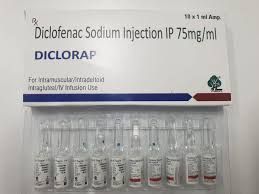Diclo 75mg Injection is a nonsteroidal anti-inflammatory drug (NSAID) used primarily for the management of pain and inflammation. It contains Diclofenac Sodium as its active ingredient and is administered via injection, typically in a clinical setting.
Key Features
- Active Ingredient: Diclofenac Sodium (75 mg per ampoule)
- Formulation: Injectable solution, usually provided in a 3 ml ampoule.
Indications
Diclo 75mg Injection is indicated for:
- Moderate to Severe Pain: Effective for pain associated with conditions such as:
- Osteoarthritis
- Rheumatoid arthritis
- Acute musculoskeletal injuries
- Postoperative pain
- Renal colic
Mechanism of Action
Diclofenac works by inhibiting the production of prostaglandins, which are chemicals in the body involved in inflammation and pain signaling. By blocking these chemicals, Diclofenac helps reduce inflammation, pain, and swelling.
Dosage and Administration
- Recommended Dosage:
- For adults, 75 mg can be administered via deep intramuscular injection, which may be repeated after 6 hours if necessary. The maximum daily dose should not exceed 150 mg.
- Administration Instructions:
- The injection should be given by a healthcare professional, typically in the upper outer quadrant of the gluteal muscle to minimize the risk of nerve damage.
Side Effects
Common side effects may include:
- Injection site reactions (pain, swelling, redness)
- Gastrointestinal disturbances (nausea, vomiting, diarrhea)
- Dizziness or drowsiness
- Headache
Serious side effects can include:
- Gastrointestinal bleeding or ulcers
- Kidney problems (reduced urine output, swelling)
- Liver dysfunction (nausea, jaundice)
- Allergic reactions (rash, difficulty breathing)
If severe reactions occur, discontinue use immediately and seek medical attention.
Precautions
- Contraindications: Do not use in patients with known hypersensitivity to Diclofenac or other NSAIDs, active peptic ulcer disease, or severe heart failure.
- Caution Required: Use with caution in patients with cardiovascular disease, hypertension, liver or kidney impairment.
- Pregnancy and Breastfeeding: Generally contraindicated during pregnancy and breastfeeding; consult a healthcare provider before use.



